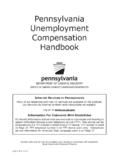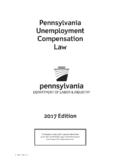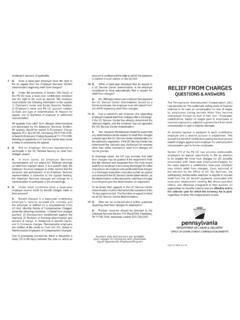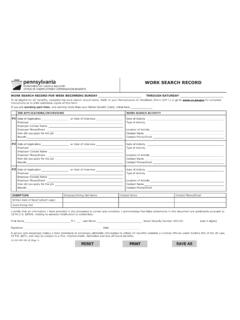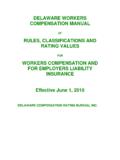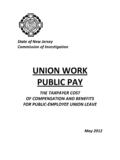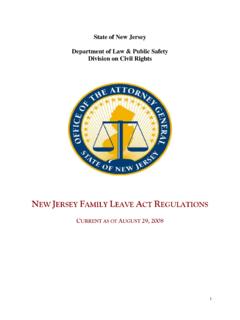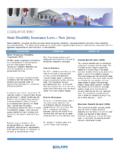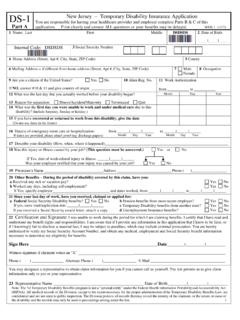Transcription of The Problem of “Localized” and “Nonlocalized” Employment
1 Unemployment Compensation .. INFORMATION FOR EMPLOYERSAn interpretation of the uniform definition of Employment . Statements in this pamphlet are intended for general information only and are not to be construed as legal interpretations of the Law or aids and services are availableupon request to individuals with Opportunity Employer/ProgramUCP-7 REV 5-08 The Problem of Localized and Nonlocalized Employment To what state must I pay my unemployment taxes? That s a frequent and often perplexing question asked by employers who have salespersons or other employees whoseduties require them to spend varying periods in several states or spend all their time in a state other than that of the homeoffice.
2 It s the employer s job to find the right answer. If the employer doesn t, and pays the wrong state, he/she could facepossible interest charges and penalties and the bothersome details of refund I, Section 4(l) of the Pennsylvania Unemployment Compensation Law states in part: (1) Employment means all personal service performed for remuneration by an individual under any contract of hire,express or implied, written or oral, including service in interstate commerce and service as an officer of a corporation. (2) The term Employment shall include an individual s entire service performed within or both within and without theCommonwealth, if -(A) The service is localized within this Commonwealth,or(B) The service is not localized in any state but some of the service is performed within this Commonwealth and(a) the base for operations or place from which such service is directed or controlled is in this Commonwealth,or (b) the base for operations or place for which such service is directed or controlled is not in any state inwhich some part of this service is performed, but the individual s residence is in this Commonwealth.
3 Section 4(l)(2)(C) provides: The term Employment shall include an individual s services whereverperformed within the United States, the Virgin Islands or Canada if - (i) such service is not coveredunder the unemployment compensation law of any other state, the Virgin Islands or Canada, and (ii) theplace from which the service is directed or controlled is in this Commonwealth. The definitions of Employment are fairly uniform in the unemployment compensation laws of the states;however, the administrators of the state agencies have not always uniformly interpreted these provisions,and many conflicts have arisen. In some cases dual coverage has resulted in double taxation of theemployer for the same service, and in other cases some services that should have been covered havenot been covered by the law of the proper state, or of any state.
4 This confusion has resulted in a loss ofbenefit rights to the DEFINITION OF EMPLOYMENTThe objective of the uniform definition of Employment is to cover under one state law all the service performed for oneemployer by an individual, wherever it is performed. The following guidelines for applying the statutory provisions , it is necessary to determine whether the service is localized in any state. Only if the service is not localized in any stateis any other test necessary. If the service is not localized, it is necessary to determine in what state the individual s base foroperations is and whether the individual performs any service in that state. If the individual has no base for operations or ifno service is performed in the state in which the base for operations is located, then it is necessary to look to the state fromwhich the individual s service is directed and controlled.
5 It is only when coverage is not determined by any of the testsabove that residence becomes a 1 -In short, it may be necessary to apply four tests to determine the state of coverage: Localization of service Base for operations Place of direction or control ResidenceLOCALIZATION OF SERVICE TESTS ervice is localized and covered in a state if it is performed entirely within that state, or it is performed both within andwithout the state and the service performed outside the state is incidental to the individual s service performed within thestate. Service is considered incidental, for example, if it is temporary or transitory in nature, or consists of isolated determining whether the service of a worker is incidental or transitory in nature, some of the factors to be considered are: Intention of the employer and employee as to whether the service is an isolated transaction or a regular part ofthe employee s work; Intention as to whether the employee will return to the original state upon completion of the work in anotherstate; and Length of service with the employer within the state compared to the length of service outside the of the wide variation of facts in each particular situation, no fixed length of time can be used as a yardstick indetermining whether or not the service is of localized service:1.
6 All services performed in one state:A salesperson for a Pennsylvania corporation who lives in Pennsylvania but performs all services in New jersey is notsubject to the Pennsylvania Law because the service is localized in New jersey even though the corporation forwhich the individual performs the service is located in Pennsylvania and residence is in Pennsylvania. No other testis Service performed within and without a contractor had a place of business in Pennsylvania where records were maintained and equipment stored andfrom which the contractor directed various jobs, wherever located. All jobs had been in Pennsylvania, but thecontractor obtained a contract for a single job in New jersey which took seven months to complete. During andafter the completion of work in New jersey , the contractor continued activities in Pennsylvania.
7 (1)A resident of Pennsylvania was hired in Pennsylvania to work on the New jersey job. When the work inNew jersey was completed, the individual was laid off and not rehired by this employer. The service in- 2 -traveling from Pennsylvania to New jersey was incidental to service in New jersey . All service waslocalized in New jersey and therefore not subject to the Pennsylvania Law. No other test is necessary.(2)A resident of Pennsylvania had been a foreman on the employer s payroll forseveral years. The individual was moved from a Pennsylvania job to the NewJersey job, where service was performed until the completion of the job, atwhich time the individual came back to Pennsylvania for continued work withthe employer. Although this employee was in New jersey for seven months, theregular work was in Pennsylvania, and the New jersey service was temporary innature and incidental to the Pennsylvania service.
8 The service, therefore, waslocalized in Pennsylvania, and service in New jersey was subject to the Penn-sylvania Law. No other test is necessary.(3)A resident of New jersey was hired for the New jersey job only. After the end of several months ofemployment in New jersey , the individual continued performing service for this employer for an equallength of time on another job in Pennsylvania. While the employee was working in New jersey , service waslocalized there. It was not covered by the Pennsylvania Law because that was the only job the individual washired for and the New jersey contract was an isolated transaction of the employer, with no likelihood offuture New jersey Employment for the individual. Since the move to Pennsylvania was considered permanent,service in Pennsylvania is localized there and is subject to Pennsylvania Law.
9 No other test is salesperson employed by a New York company lives in New jersey . The territory covered was in theCommonwealth of Pennsylvania. Services were directed and controlled from the New York of-fice, and occasionally the sales person returned to that office for supplies and instructions. Onother occasions the individual was required to call upon customers in the state of New the regularly assigned territory was the Commonwealth of Pennsylvania, the New Yorkservice was temporary in nature and incidental to the Pennsylvania service. Service, therefore,was localized in Pennsylvania, and service in New York was subject to the Pennsylvania Law. Noother test is examples:Guidance from the USDOL for interpreting state statutory provisions on localization of work was last issued in historical events have now demonstrated the need to provide more current examples of Employment situations thatrequire the uniform interpretation among the States.
10 The new examples are: The terrorist attack on the United States on September 11, 2001, which required employers to temporarilyrelocate from New York to New jersey ; The advent of the Internet which allows workers to perform services through telecommuting for an employerthat may be located in a different state; and The takeover of a major airline company by another that required flight attendants to commute long distances to World Trade Center example:Approximately 40 employers and 1,500 employees who were working in the area of the World Trade Center inNew York City prior to the terrorist attack of September 11, 2001, were temporarily relocated to New jersey . After- 3 -the relocation, it was determined that the employees services were localized in the State of New York because theirwork performed in New jersey was temporary, with the understanding that the employers intended to return to NewYork as soon as recommended definition of temporary is approximately 12 months or less, as long as it is applied with someflexibility, taking into consideration the various circumstances under which the work is performed.
